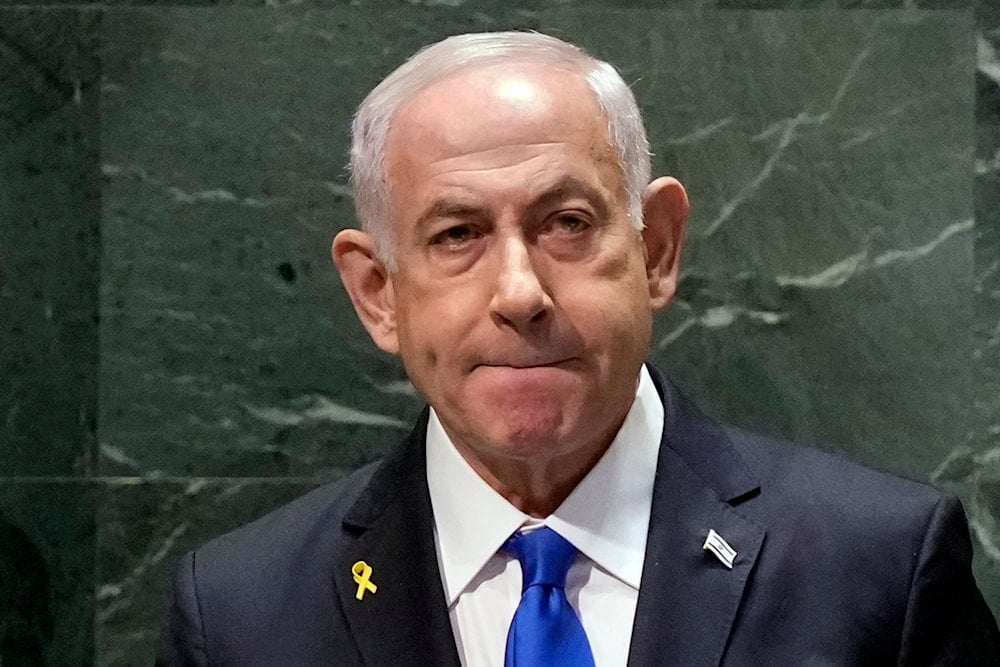Netanyahu torn between officials, settlers amid possible ceasefire
Settlers are losing faith in Netanyahu's government, while members of Likud criticize the agreement, putting increasing pressure on Netanyahu.
-

Israeli Prime Minister Benjamin Netanyahu during his address to the 79th session of the United Nations General Assembly, on September 27, 2024. (AP)
Israeli Prime Minister Benjamin Netanyahu expressed to his close associates deep frustration with the coalition's criticism of the possible ceasefire agreement in the north, Israel Hayom reported on Tuesday.
The newspaper reported that Netanyahu is frustrated by the criticism the agreement is receiving, both in the right-inclined public opinion, as well as within Likud circles and among his voters.
Israel Hayom learned that Netanyahu "intends to begin talks with the opposition," where he "is expected to speak with Minister Amichai Chikli, who issued a statement criticizing the agreement."
The newspaper also noted that Police Minister Itamar Ben-Gvir criticized the settlement, stating on Army Radio that he would vote against it in the cabinet. However, unlike his earlier statements regarding a potential agreement in Gaza, he did not threaten to resign from the government.
Similarly, former Security Minister and leader of the Israeli State Camp party, Benny Gantz, opposed the agreement, arguing that "the Lebanese government is giving Hezbollah a free hand," which could lead to attacks on Lebanese state assets.
A political source explained yesterday that the US forces to be stationed in Lebanon in the coming days will be there to supervise, not to implement, similar to the role of the UNIFIL forces. This deployment will occur after the Israeli army withdraws and the Lebanese army takes position in the country's south.
The source added that the US forces are expected to leave once this transition is complete.
This comes amid media reports suggesting a possible ceasefire agreement in Lebanon, with officials in Beirut expressing caution. Meanwhile, criticism continues within "Israel" regarding the potential deal, with heads of settlements and northern regional councils calling it a "surrender agreement" on "Israel's" part.
Israel Hayom reported on a private discussion held on Sunday evening at Netanyahu's office, attended by security officials and ministers Israel Katz, Gideon Sa'ar, Ron Dermer, Bezalel Smotrich, and Itamar Ben-Gvir. During the meeting, the final details of the ceasefire agreement with Lebanon were agreed upon, with officials noting that "Israel has decided to move forward toward reaching an agreement in the near future."
The newspaper also highlighted that the potential agreement requires not only the approval of the Israeli government and cabinet but must also be submitted to the Knesset for a vote in accordance with the demand of the leftist coalition during the mediated maritime agreement with Lebanon.
The newspaper quoted a political official as saying, "It is a matter of days, or perhaps even less, before the ceasefire agreement with Lebanon is signed." The official also noted that significant progress has been made and that an unofficial agreement already exists between "Israel" and Lebanon.
Settlers lose confidence in Netanyahu: Is the settlement a success or a surrender?
Following the events of October 7, 2023, and amid current media reports about the imminent signing of a ceasefire agreement in the north, Brigadier General Tzvika Haimovich is, once again, highlighting the growing crisis of confidence between the settlers and local leadership, as well as between Israeli authorities and the security and military establishment.
In an article for Israel Hayom on Tuesday, Brigadier General (res.) Tzvika Haimovich acknowledged that "any agreement, even the best one, will not resolve the crisis of trust and the gap between the two sides."
He argued that the agreement "must serve as the beginning of a long process and a path toward consensus between the state and the citizens of the north (the settlers)," aimed at restoring the trust that had been damaged and violated in the years leading up to the war and during the war itself.
The strategic advisor and former air defense commander highlighted that a public debate is ongoing regarding the agreement—whether it represents a success or a surrender for the occupation entity. He also raises the question: Did October 7 change anything in "Israel's" policy of containment and restraint? This, he asserts, is the key issue that will be tested once the agreement takes effect.
Read next: Majority of Israeli settlers in favor of ceasefire in Lebanon: Poll
He questions whether the Yemenis and Iraqis will also cease operations at "Israel" following the settlement. Additionally, he asks, "Will the settlement in the north create conditions where the heads of the security and military establishment reach personal conclusions and take responsibility for the decisions they assumed over a year ago?"
The strategic advisor urged vigilance in the coming hours and days as the time for action approaches, emphasizing that "this is not the time for indifference or dullness of the senses." He stated that "Israel and its citizens, especially in the north, want real and lasting calm and order."
He added that, without a doubt, this would lead to a swift return to routine for many, and only then would the process of reconstruction and rehabilitation begin, expressing his "fear that these hours contain a great explosive potential" against "Israel".

 5 Min Read
5 Min Read








